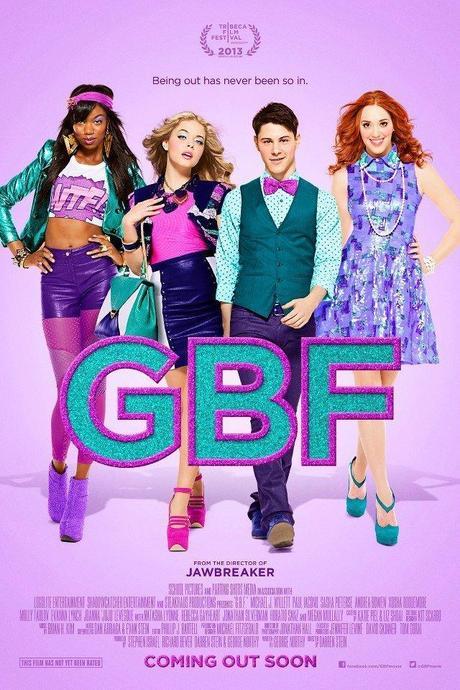
Earlier this week, I commented on the propensity for moviemaking trends to repeat themselves in terms of the scale of blockbusters. Upon watching the 2014 film "G.B.F." (an acronym for gay best friend), I'm now also reminded of the propensity for filmmakers to borrow elements from other films that came before. In the case of this film, it's the highly regarded "Mean Girls" of 10 years prior from which it draws its influences. Unfortunately, in trying to replicate that film's success, "G.B.F." fails to carve out its own identity, even though its premise suggests something new.
Said premise of "G.B.F." is a high school coming out story. It centers around a reserved young man named Tanner (Michael J. Willett), who reluctantly gets outed by his school's Gay-Student Alliance in their quest to recruit the first gay person into their club. Unfortunately for them, a trio of popular girls have other plans. As prom night approaches, they all compete for Tanner's affections, hoping that a gay best friend will increase their chances of winning prom queen. Unable to settle it fairly, they devise a win-win situation where Tanner befriends all three in exchange for protection from the school bullies. Of course, complications arise as the girls struggle to share their new accessory and Tanner's new clique puts a strain on his relationship with his former best friends (one of whom is also gay).
On paper it all sounds like a fresh perspective on the high school comedy, placing a gay character front and center. It seemed like an opportunity for some interesting insight into the young gay perspective but sadly, the film feels like a rehash of storylines we've seen before. The most apparent comparison is of course, "Mean Girls". There are similar plot points and the characters are almost the same - a "fish out of water" protagonist, three popular girls (the pretty but mean queen bee, the ditzy one and the undervalued one who's jealous of the queen bee), the unpopular best friends and the concerned teacher with a heart of gold. It doesn't help that the film also actively acknowledges "Mean Girls" too, referencing Lindsay Lohan and the "things I've learned" prom speech.
Sadly, the film didn't steal any of that film's finer qualities outside of its basic structure. From the first scene there's a fakeness to the setting that makes the film hard to take seriously. There's just no sense of place (sometimes it feels like a liberal northeast school and other times it could pass for a conservative red state). It also lacks visual flair, with hardly any physical comedy to stimulate the senses. Sorry George Northy (the screenwriter), but there's nothing inherently funny about two gay boys having a private bedroom dance party. Without the sight gags, it tries to compensate with the writing, but it lacks the invaluable wit that Tina Fey gave to her film. I can count the funny lines of dialog on a single hand. As such, everything just falls flat and that includes our protagonist. One could argue that Willett's bland acting is intentional (he doesn't conform to the effervescent gay stereotype) but he seriously brings down the film's energy.
Tanner's dullness further exacerbates the film's "Mean Girls" problem. Specifically, the most intriguing characters end up being the three girls rather than the central character. Queen Bee Fawcett is smarter than she appears, token black girl Caprice is a champion of equality and Shley is a conservative Mormon girl who proves to be surprisingly tolerant and adventurous. They all have more depth than Tanner, who's only defining characteristic seems to be his sexuality. Yet still, the writing refuses to commit to these characters, only allowing Fawcett to get full character development. There's a fascinating opportunity with Caprice (at one point she's offensively referred to as a sassy black friend) to mirror Tanner's experience with societal pigeonholing, but it's never properly explored. Meanwhile Shley is saddled with all the narrative cliches of being ditzy, drunk and sexually frustrated. It's evident that the script should have narrowed its focus on either the gay teen's coming of age or the politics of high school girls running for prom queen.
There's a worthwhile story to be told from the idea of "G.B.F.", but this film fails to deliver it. Instead, this is nothing more than a poor man's "Mean Girls". If you count yourself as one of the many fans of that film, then I'd recommend watching that rather than wasting your time with this uninspired effort.
